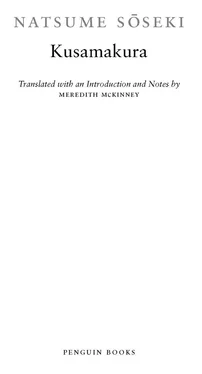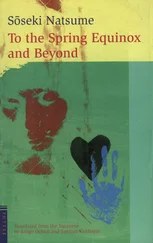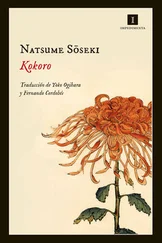Natsume Soseki - Kusamakura
Здесь есть возможность читать онлайн «Natsume Soseki - Kusamakura» весь текст электронной книги совершенно бесплатно (целиком полную версию без сокращений). В некоторых случаях можно слушать аудио, скачать через торрент в формате fb2 и присутствует краткое содержание. Жанр: Старинная литература, на английском языке. Описание произведения, (предисловие) а так же отзывы посетителей доступны на портале библиотеки ЛибКат.
- Название:Kusamakura
- Автор:
- Жанр:
- Год:неизвестен
- ISBN:нет данных
- Рейтинг книги:4 / 5. Голосов: 1
-
Избранное:Добавить в избранное
- Отзывы:
-
Ваша оценка:
- 80
- 1
- 2
- 3
- 4
- 5
Kusamakura: краткое содержание, описание и аннотация
Предлагаем к чтению аннотацию, описание, краткое содержание или предисловие (зависит от того, что написал сам автор книги «Kusamakura»). Если вы не нашли необходимую информацию о книге — напишите в комментариях, мы постараемся отыскать её.
Kusamakura — читать онлайн бесплатно полную книгу (весь текст) целиком
Ниже представлен текст книги, разбитый по страницам. Система сохранения места последней прочитанной страницы, позволяет с удобством читать онлайн бесплатно книгу «Kusamakura», без необходимости каждый раз заново искать на чём Вы остановились. Поставьте закладку, и сможете в любой момент перейти на страницу, на которой закончили чтение.
Интервал:
Закладка:
If she knows but does not feel it as a danger, she is uncanny. Loitering thus, so serene and poised, between the realms of being and nonbeing, her original dwel ing must surely be that blackness, and this temporary phantom is now in the act of returning into the obscure darkness of its true home.
The real nature of this figure is suggested by her kimono, whose bewildering pattern inexorably melts and disappears into inky black.
Another image: when a beautiful woman fal s into lovely slumber and in the midst of this sleep draws her last breath in this world, we who watch by her pil ow are stricken with grief. But if to the given pains of existence a thousand pains are added in dying, the woman herself, weary of pointless living, would feel with those who watch over her that relief from her suffering would be nothing but merciful. But how does a young child who dies easily in his sleep deserve his fate? A child drawn down to the realms of the dead in sleep has lived its precious life in a blind moment, with no preparation for death. If someone must be kil ed, let him first feel the absolute karmic inevitability of the fact, resign himself, and die with a prayer on his lips. If before your eyes is only the vivid fact of death, without the conditions that natural y lead to death, then you long not to chant the last rites over the dying but to cry out and summon back those feet that have already stepped halfway into the other world. Perhaps she who is slipping unaware from her mortal into her immortal sleep suffers by being cal ed back like this, being dragged unwil ingly by the chains of existence that she was in the act of severing. Be merciful, she may think, and do not cal me, but let me quietly sleep. And yet we long to cal .
When the woman appears once more beyond the doorway, I have just such an urge, to cal her back and save her from the depths of unreality—but when her dreamlike form glides across the three-foot-wide space before my eyes, I find myself speechless. The next time, I decide, but then once more she slips past. Why can’t I speak? I wonder, and as I wonder she passes again. She passes without the least show of awareness that someone might be watching, or might be gripped by anxiety for her. She passes in seeming indifference to the likes of me, neither burdened by my fears nor pitying me for them. As I watch, summoning myself again and again to cal , the clouds at last began to spil the moisture they have so long withheld, and soft threads of rain close their melancholy curtain about that distant form.
CHAPTER 7
It’s cold. Towel in hand, I set off down to the bathhouse.
After disrobing in the little changing room, I descend the four steps that bring me into the large bathroom. There seems to be no dearth of local stone. The bathroom floor is paved with granite; in the middle a bathtub the size of a substantial tofu sel er’s vat has been sunk about four feet into the ground, and unlike a normal tub, it too is lined with stone. The place has a name as a hot spring, so presumably the water contains a variety of mineral elements, but it is perfectly clear and thus a pleasure to step into. Lying here in the tub, I even take an occasional experimental sip, but it has no particular taste or odor. The water is reputed to have medicinal qualities, but as I haven’t bothered to ask, I have no idea what ailments it cures. I suffer from no particular il ness, so it hasn’t occurred to me to wonder what the water’s practical value might be. The only thing that comes into my head as I lower myself into the tub are the lines from Po Chu-i’s poem, “Softly the warm spring waters / bathed the white beauty’s skin.†Whenever I hear the words “hot spring,†I taste again the deep pleasure that these lines evoke, and indeed it seems to me that no hot spring is of the least value unless it can produce in me precisely the sensation summed up in these lines. My sole requirement for a hot spring, you might say, is that it fulfil this ideal.
Once I am in the deep bath, the water comes up to my chest. I can’t tel from whence it issues, but it is continual y flowing gently out over the edge of the tub. The stone floor never has a moment to dry, and the warmth of it underfoot fil s my heart with a tranquil happiness. Outside, rain is fal ing—at first gently enough merely to haze the night, delicately imparting a subtle moisture to the spring air, but slowly the drops from the eaves begin to fal more rapidly, with an audible drip, drip . A thick steam fil s every corner of the bathhouse to the very ceiling, so dense that it must be seeking a way out through any gap or knothole, however smal , in the wooden wal s.
Chil autumn fog, a spring mist’s serenely trailing fingers, and the blue smoke that rises as the evening meal is cooked—al deliver up to the heavens the transient form of our ephemeral self. Each touches us in its different way. But only when I am wrapped, naked, by these soft spring clouds of evening steam, as now, do I feel I could wel be someone from a past age. The steam envelops me but not so densely that the visible world is lost to view; neither is it a mere thin, silken swath that, were it to be whipped away, would reveal me as a normal naked mortal of this world.
My face is hidden within voluminous layers of veiling steam that swirl al about me, burying me deep within its warm rainbows. I have heard the expression “drunk on wine†but never “drunk on vapors.†If such an expression existed, of course, it could not apply to mist and would be too heady to apply to haze. This phrase would seem truly applicable only to this fog of steam, with the necessary addition of the descriptive “spring evening.â€
I pil ow the back of my head on the rim of the bathtub, relax every muscle, and let my weightless body float in the translucent water. My soul too drifts lightly, like a jel yfish. When I am in this state of mind, the world is an easy place to inhabit. You unbar the doors of common sense that lock up the mind, and fling open the heart’s barriers of worldly attachment. What wil be wil be, I think, afloat here in the water, at one with the surrounding medium. No life knows less suffering than the life of that which flows, and being in the midst of flow, with the very soul afloat on its waters, is an even finer thing than being a fol ower of Christ himself. Seen in this light, even a drowned body becomes an essential y elegant, aesthetic object. I think the poet Swinburne, in one of his poems, wrote of the happiness felt by a drowned woman. Looked at thus, Mil ais’s painting of Ophelia, which has always somehow disturbed me, is in fact a work of considerable beauty. I have long wondered why he chose such an unpleasant scene, but now I see just why it works as a picture. There is undoubtedly something inherently aesthetic about a figure drifting or sunk, or half afloat and half sunk, lying at ease upon the flow. If you add an abundance of herbs and flowers along the banks, and depict the water and the face and clothes of the floating figure in serene and harmonious colors, there you have your picture. And there is such peace in the expression of that floating girl that it almost belongs to the realm of myth or al egory. Of course, if she were depicted writhing in a spasm of agony, it would quite destroy the spirit of the work, but on the other hand an utterly unal uring and indifferent expression would convey no trace of human feeling. What kind of face would work? I wonder idly. Mil ais’s Ophelia may wel be successful on its own terms, but I suspect that his spirit and mine inhabit different realms. Mil ais is Mil ais, I am me, and I feel the urge to try painting an elegant picture of a drowned corpse after my own fancy. But conceiving of the face I want for it isn’t such a simple thing.
Читать дальшеИнтервал:
Закладка:
Похожие книги на «Kusamakura»
Представляем Вашему вниманию похожие книги на «Kusamakura» списком для выбора. Мы отобрали схожую по названию и смыслу литературу в надежде предоставить читателям больше вариантов отыскать новые, интересные, ещё непрочитанные произведения.
Обсуждение, отзывы о книге «Kusamakura» и просто собственные мнения читателей. Оставьте ваши комментарии, напишите, что Вы думаете о произведении, его смысле или главных героях. Укажите что конкретно понравилось, а что нет, и почему Вы так считаете.












